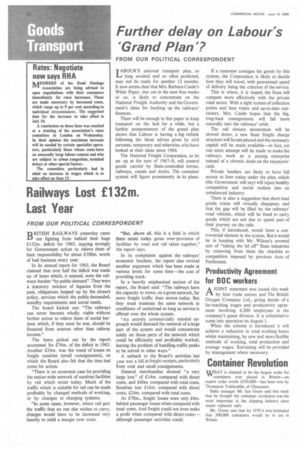Railways Lost £132m.
Page 32

If you've noticed an error in this article please click here to report it so we can fix it.
Last Year
FROM OUR POLITICAL CORRESPONDENT BRITISH RAILWAYS yesterday came out fighting from behind their huge £132m. deficit for 1965, arguing strongly for Government action to relieve them of their responsibility for about £10Chn. worth of bad business every year.
In its annual report for 1965, the Board claimed that over half the deficit was made up of items which, it seemed, were the railways burden "by public demand". They were a statutory mixture of legacies from the past, obligations heaped up by the closure policy, services which the public demanded, standby requirements and social needs.
The board kicked out: "The railways can never become wholly viable without further action to relieve them of social burdens which, if they must be met, should be financed from sources other than railway income."
The items picked out by the report accounted for £76m. of the deficit in 1965. Another £24m. was the result of losses on freight sundries (small consignments), on which the Board also felt that the time had come for action.
"There is no economic case for providing the nation-wide network of sundries facilities by rail which exists today. Much of the traffic which is suitable for rail can be made profitable by changed methods of working, or by changes in charging systems.
"In some cases, however, where rail gets the traffic that no one else wishes to carry, charges would have to be increased very heavily to yield a margin over costs. "But, above all, this is a field in which there exists today gross over-provision of facilities by road and rail taken together," the report says.
In its complaints against the railways' economic burdens, the report also revived another argument which has been made at various levels for some time—the cost of providing track.
In a heavily emphasized section of the report, the Board said: "The railways have the capacity to move, on a given network, far more freight traffic than moves today. But they must maintain the same network in conditions of underload so long as service is offered over the whole system.
"An entirely commercially minded approach would demand the removal of a large part of the system and would concentrate solely on those parts of the network which could be efficiently and profitably worked, leaving the problem of handling traffic peaks to be solved in other ways."
A setback to the Board's activities last year was a fall in freight receipts, particularly from coal and small consignments.
General merchandise showed "a very large loss" of £14m. compared with direct costs, and £40m. compared with total costs. Sundries lost £16m. compared with direct costs, £24m. compared with total costs.
At £78m., freight losses were only £4m. behind passenger losses when compared with total costs. And freight could not even make a profit when compared with direct costs— although passenger activities could.




























































































































